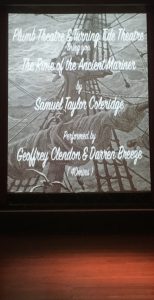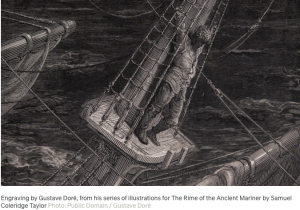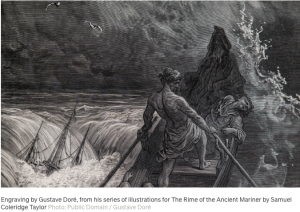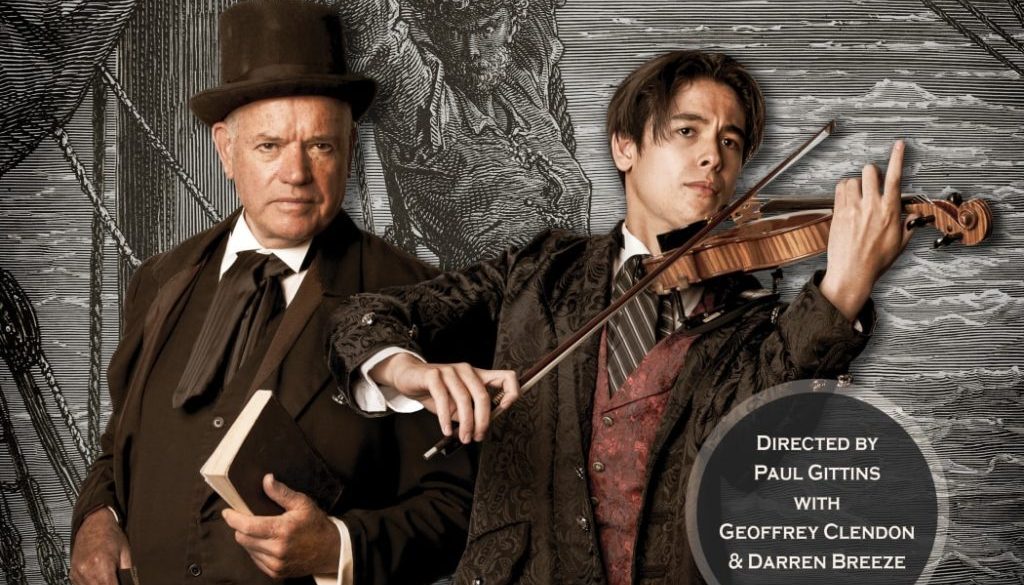The Rime of the Ancient Mariner – Dir. by Paul Gittins: Pitt St Theatre (April 7)
THE RIME OF THE ANCIENT MARINER is one of those stories that everybody knows, but few have ever heard, and rarely as well delivered as this. It’s a poem, you know, by Coleridge — from the very dawn of the Romantic Era — full of ice and snow and haunting spirits who punish an evil deed.
Last night at Pitt St Theatre we saw a dramatic delivery of the Mariner’s story by Geoffrey Clendon, with violinist Darren Breeze giving musical voice to the Mariner’s emotional trauma. It was short. It was memorable. It was intense.
The stage is sparsely set. With Clendon and Breeze clad in nineteenth-century formal wear, Breeze’s evocative playing, and Gustav Dore’s powerful etchings of Coleridge’s poem upon a large screen like an old-time magic-lantern show, we could almost have been back in the original old-world multi-media experience. It was magical.
Clendon’s declamation was dramatic, but never overdone. We were fully engaged throughout. Breeze’s playing — sometimes background, sometimes foreground — supported the story, but never overwhelmed it, with pieces cleverly chosen to match the tone. We heard Massenet and Mozart, Mendelssohn and Vaughan-Williams, sea shanties and stomps — and of course the inevitable Vivaldi and Saint-Saëns, all well interwoven with the piece. The haunting ‘Red Violin Caprices’ by John Corigliani accompanies the turning point of the story:
 “I looked upon the rotting sea,
“I looked upon the rotting sea,
And drew my eyes away;
I looked upon the rotting deck
And there the dead men lay.
I looked to heaven, and tried to pray;
But or ever a prayer had gush’t,
A wicked whisper came, and made
My heart as dry as dust.
I closed my lids, and kept them close,
And the balls like pulses beat;
For the sky and the sea, and the sea and the sky
Lay dead like a load on my weary eye,
And the dead were at my feet.”
 The Mariner has been punished for his ‘rape of nature.’ Punished by being condemned to live, while his colleagues die, like the Flying Dutchman or the Wandering Jew. His crime is to shoot, with his crossbow, a friendly albatross that regularly visited his companions aboard ship in an ice-bound Southern Ocean expedition (reminiscent of James Cook). Superstition told the sailors that the bird had brought good winds, and deliverance from their icy plight. (“Rime,” you know, actually means ‘frost’). Its execution led to their demise, with the Mariner’s cursed fate to stalk the earth for evermore, telling his tale to unwitting passersby to get it off his chest.
The Mariner has been punished for his ‘rape of nature.’ Punished by being condemned to live, while his colleagues die, like the Flying Dutchman or the Wandering Jew. His crime is to shoot, with his crossbow, a friendly albatross that regularly visited his companions aboard ship in an ice-bound Southern Ocean expedition (reminiscent of James Cook). Superstition told the sailors that the bird had brought good winds, and deliverance from their icy plight. (“Rime,” you know, actually means ‘frost’). Its execution led to their demise, with the Mariner’s cursed fate to stalk the earth for evermore, telling his tale to unwitting passersby to get it off his chest.
The motif of the crossbow that sent the fatal arrow is obvious enough — the albatross’s symbolism (the dead albatross being slung round the Mariner’s neck: “instead of the cross, the albatross, about my neck was hung”) has been with us ever since Coleridge gave it to us: the sailors’ former good luck charm, once shot, becomes a metaphor for a psychological burden that feels like a curse, that stays with us as some kind of eternal punishment. A symbol used since by everyone from Te Whiti at Parihaka to John Lydon in Public Image Limited.
“I’ve seen you up far too close
Getting rid of the albatross”
~ ‘Albatross,’ by Public Image Limited
 Sailors’ superstitions were not wholly without cause. Before powered transport, ships relied for motive power on oft-fickle winds, days without winds producing, as Colerlidge puts it, “a painted boat on a painted ocean.” In pre-scientific days, one sometimes needed to appease the gods, or spirits, to deliver the much-needed wind. Big calls were sometimes made: Homer famously tells how Agamemnon chose to sacrifice his daughter to appease the gods of wind, leading to his own much-told tragedy. Our Ancient Mariner, one of the original unreliable narrators, is in this tradition of violating such a superstition.
Sailors’ superstitions were not wholly without cause. Before powered transport, ships relied for motive power on oft-fickle winds, days without winds producing, as Colerlidge puts it, “a painted boat on a painted ocean.” In pre-scientific days, one sometimes needed to appease the gods, or spirits, to deliver the much-needed wind. Big calls were sometimes made: Homer famously tells how Agamemnon chose to sacrifice his daughter to appease the gods of wind, leading to his own much-told tragedy. Our Ancient Mariner, one of the original unreliable narrators, is in this tradition of violating such a superstition.
The tale was well told last night, our own narrator doing sterling work. This is another successful production by Paul Gittins’s small but high-achieving Plumb Theatre Company, in association with Turning Tide. This two-man production, delivered over four nights, doubles as a fundraiser for young violinist Darren Breeze, “discovered” by Clendon, who aims to study overseas in pursuit of his goal of being a professional musician.
One feels he will succeed.
Interview here.
THEATRE PETER
- Nicola Cheeseman is Back -dir. by Paul Gittins: Herald Theatre (Aotea Centre) 19 June – 7 July - June 20, 2024
- The Rime of the Ancient Mariner – Dir. by Paul Gittins: Pitt St Theatre (April 7) - April 8, 2024
- AIGA – Touch Compass Theatre, dir. by Moana Ete, Te Pou Theatre, Henderson March 20-24 - March 20, 2024

